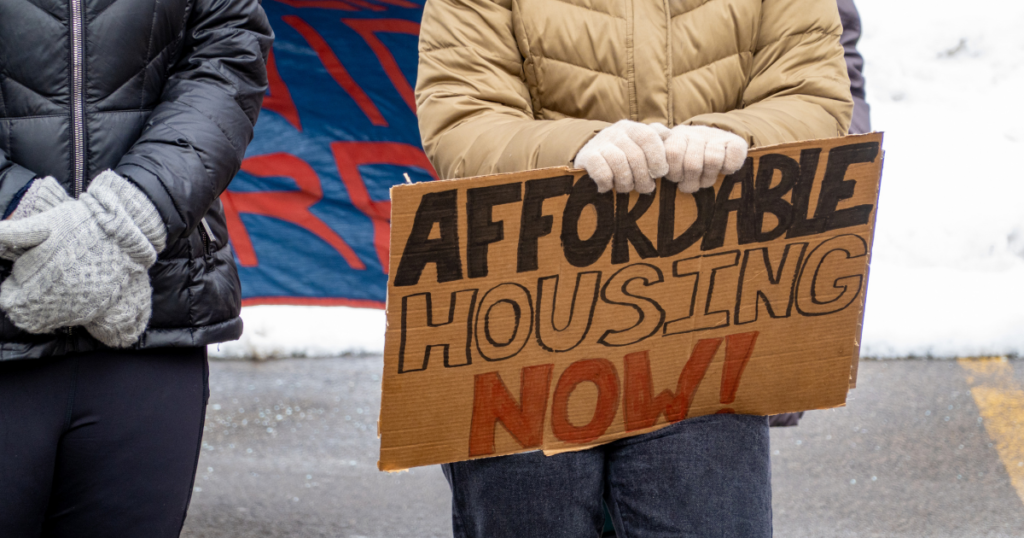Maine has made strides in addressing the shortage of housing that is leaving more and more people vulnerable to housing insecurity and homelessness. However, if we are to meet the full demand for housing — 80,000 additional units by 2030 — we will need to nearly double the rate of housing production. This will be no quick or easy task.
The Legislature has the opportunity to provide secure housing to Mainers with low income by barring landlords from refusing to rent to people receiving housing assistance and by creating a dedicated rental assistance program.
Both measures will help to clear the years-long waitlist for federal rental assistance, take pressure off municipal general assistance programs struggling to keep up with rising demand for housing assistance, and help more Mainers remain financially and physically stable.
Even if we act now and do more to directly invest in affordable housing production and make it easier to build housing across the state, it will take years to see widespread results. With eviction filings and homelessness increasing across the state, Mainers are struggling to stay housed and cannot afford to wait this long.
Housing vouchers are effective, but limited by discrimination
Section 8 Housing Choice Vouchers are the largest rental assistance program in the US. These vouchers allow families to search for housing they would otherwise have difficulty affording (within certain limits) and only pay between 30-40 percent of their income on rent. The voucher covers the difference between the family’s payment and the actual rent for the unit. There are nearly 12,000 vouchers currently active in Maine, and the program is proven to be effective in reducing housing instability. Because the vouchers open up more residential options to families rather than concentrating them in neighborhoods that may lack public services or be unsafe, vouchers have the potential to reduce economic segregation, although other factors significantly limit this potential. Housing Choice Vouchers also help to combat the intergenerational cycle of poverty. When parents use vouchers to move to neighborhoods with lower poverty rates, research has shown their children receive more education on average and go on to earn higher incomes in adulthood.
While Housing Choice Vouchers significantly benefit households that can use them, not every household is able to put them to use. After receiving a voucher, families have a limited time to find housing (typically within 60-120 days in Maine, with the limits set by each local Public Housing Authority). If a family cannot find eligible housing within the allotted time, their voucher “expires” and they are placed back on the waitlist where they may wait for over six years. The vouchers can only be used on units within certain rent limits and the landlord of those units must agree to participate in the Housing Choice Voucher program by complying with federal safety standards. Out of a reluctance to comply with the federal standards, or due to classist stereotypes about the types of people who receive housing assistance, many landlords refuse to rent to voucher holders, a practice referred to as “source of income discrimination.”
To combat discrimination and improve the ability of Housing Choice Vouchers to provide effective relief to families, many states and cities across the country have banned source of income discrimination. These laws have proved effective, helping voucher holders to find safe housing for their families and helping local Public Housing Authorities use more of the vouchers they are given to distribute.
This increased efficiency is sorely needed in Maine. Last year, nearly one in three vouchers issued by Maine Housing expired because their recipients were unable to find a suitable place to live. No one who has waited years to receive critical assistance their family needs should watch it slip through their fingers because no one was willing to rent to them. If Maine were to ban landlords from refusing to rent to voucher holders, more families would be able to use the assistance they receive, and the Housing Choice Voucher program would be stronger as a result.
A state rental relief program would help clear the housing voucher waitlist and take pressure off municipal assistance programs
The waitlist for Housing Choice Vouchers is more than 22,500 people long and the pandemic Emergency Rental Assistance program served more than 32,000 Maine households between March 2021 and September 2022. Despite the Emergency Rental Assistance program expiring, Mainers’ need for housing stability hasn’t gone anywhere. For instance, there are twice as many extremely low-income renter households in Maine as there are housing units affordable at that income level. Creating a dedicated rental relief program would reduce homelessness and ease some of the strain placed on municipal general assistance programs struggling to keep up with their residents’ housing needs.
Legislators can provide stability to Maine renters
This year, legislators can choose to support bills that would increase Mainers’ ability to weather the affordable housing crisis.
- LD 1540, as amended, would create a pilot program providing $300 per month in rental assistance to families at risk of eviction.
- LD 1732 would restore state support for municipal general assistance programs back to its pre-2015 level, reducing the strain the crisis is placing on local governments. While general assistance was never intended to be a dedicated housing assistance program, the severity of the affordable housing crisis has forced local officials to act as the front-line defense against housing insecurity and homelessness. The state should support local governments in their efforts to tackle this statewide crisis.
- LD 1710 is also before the legislature. Originally, this bill would have banned source of income discrimination and created an assistance program for renters with extremely low income who, due to the waitlist, are unable to receive federal housing assistance. However, the bill was recently amended in committee to create a commission to explore how to improve tenant-landlord relationships and address source of income discrimination. While there is value in gathering more information, this change further delays alleviating the struggles many Mainers experience in using vouchers. In the next legislative session, legislators should take concrete steps to ban source of income discrimination and increase the availability of rent relief.
Addressing Maine’s affordable housing crisis will require both short- and long-term thinking. Through efforts including funding for affordable housing production and reforming zoning laws, the state government has shown considerable dedication to alleviating the crisis down the road. Now is the time to ensure more Mainers can make it that far.




